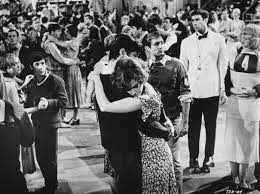Raising social consciousness is commonly cited as the motivation behind crafting a classic film such as 1932's I Am A Fugitive From A Chain Gang. The theme of freedom is prominent throughout the film. Paul Muni's brilliant portrayal of a down-on-his-luck wanderer named James Allen consistently discusses man's desire to be free.
The Freedom Theme
Allen becomes a drifter because he wants to be free of his dull home life. Drafted into the army only to be discharged to face the monotony of a factory job, Allen makes his way across the country only to lose his freedom again after being falsely convicted of a crime and ending up serving his sentence on a brutal chain gang.
Escaping from the chain gang offers a brief respite of freedom and a new lease on life. And then he is trapped in a loveless marriage. Upon freeing himself from the union, he finds himself back on the chain gang.
Freedom, it seems, only comes and goes.
Or is, as the title self-aware computer of the sci-fi classic Colossus: The Forbin Project assesses, "Freedom is an illusion."
For James Allen, freedom is fleeting to the point it barely exists. Likely, for him, it never exists. He reinvents himself numerous times to achieve a level of personal and outright physical freedom. He changes jobs, changes his lot in life through a prison escape, changes his identity, and so on.
Freedom never arrives for James Allen because, although circumstances change, Allen never really changes. He is the symbolic ball and chain, which is tied to a literal ball and chain.
Chained to Unchanging Circumstances
Was James Allen predestined to be a prisoner both literally and figuratively? Based on his life, as seen in the film, this good, moral, virtuous man never changes. He remains the same individual from scene to scene, and he suffers greatly no matter what backdrop he is placed on.
James Allen's life on the outside of the chain gang mimics what life was like on the inside. And no, the notion of freedom is an illusion. There is a sameness to things. Allen tries to make changes in his life. Looking for a new job is less melodramatic than an escape from prison.
The ultimate sameness is James Allen himself.
*****
Check Out My Collection of Essays on Amazon Kindle!
*****
Allen simply cannot catch the proverbial break. No matter what circumstances the man finds himself in, things never work out well for him. The narrative of I Am A Fugitive From A Chain Gang consistently features ever-changing backdrops.
This is why life is so difficult for the man. He cannot fit well into any of the new lives he places himself or lands.
In a tragic sense of irony, James Allen finally does change in the film's final minutes - he loses his morality and virtue, allowing him to better fit into the backdrop of a fugitive.



![Universal Monsters & Neurotics: Children of the Night and Their Hang-Ups by [Anthony M. Caro]](https://m.media-amazon.com/images/I/41p32SUE79L.jpg)




